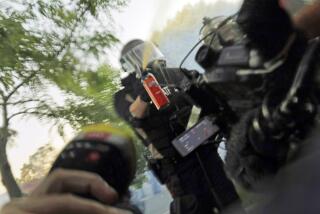2 U.S. reporters get 12 years in N. Korea
Two American television journalists today were convicted of a “grave crime” against North Korea and sentenced to 12 years of hard labor, a move that increased mounting tensions between the U.S. and the reclusive Asian state.
Laura Ling and Euna Lee, reporters for San Francisco-based Current TV, were sentenced by the top Central Court in Pyongyang in a two-day trial that started Friday as U.S. officials demanded the release of the two women.
The state-run Korean Central News Agency reported that the court “sentenced each of them to 12 years of reform through labor” but gave no further details.
Because the pair were tried by the nation’s highest court, there can be no appeal.
After the verdict, U.S. officials reissued their call for North Korea to release them.
“We are deeply concerned by the reported sentencing of the two American citizen journalists by North Korean authorities, and we are engaged through all possible channels to secure their release,” State Department spokesman Ian Kelly said in the statement.
Ling and Lee were arrested March 17 along the China-North Korean border after top officials in Pyongyang said they had encroached on North Korean soil while reporting a story on human trafficking by Kim Jong Il’s regime.
Housed separately in Pyongyang since their arrest, the women have reached out to family members in the U.S., who have in the last week made several public appeals for their release.
Japanese television has reported that Current TV founder Al Gore was prepared to fly to Pyongyang and secure the women’s freedom, depending on the outcome of the trial. It was not known how the guilty verdict might have affected those plans.
Initially, Current TV and the families tried to keep the arrests quiet, hoping that behind the scenes negotiations would avoid turning it into a diplomatic incident. But North Korea’s intransigence prompted them to go public along the lines of supporters of the journalist Roxana Saberi, who was released by Iran last month. They have made a number of recent appearances on television and held a candlelight vigil Wednesday to pray for their release.
The families could not be immediately reached for comment when the sentence was announced.
But Paul Song, who is married to Laura Ling’s sister, CNN personality Lisa Ling, wrote on his Facebook posting a few minutes afterward: “12 years hard labor!! Please let them go!!”
Many analysts speculate that North Korea, which has in recent months sought to publicly establish its nuclear capabilities -- conducting an underground nuclear test and launching several experimental missiles -- was trying to use the women as political pawns in an attempt to force Washington to sit down for one-on-one talks.
The women’s trial was not open to the public.
Choi Choon-heum, a senior research fellow at the Korea Institute for National Unification, said the verdict was not surprising.
“It was beyond expectations, but no matter what they are doing, they have no choice but to release them in the end,” he said. “Obviously it showed a strong will from the military as well. But there is nothing we worry about too much.”
The harsh sentence is another in a string of defiant acts by an increasingly provocative North Korea, which last month conducted its second nuclear test and appears poised to test a long-range missile. In the past, when North Korea has captured foreigners, it has used them to seek diplomatic favor or financial aid. A U.S. army helicopter pilot, Bobby Hall, captured in 1994 near the demilitarized zone with South Korea, was released after only 13 days.
Scott Snyder, an analyst who has written frequently on North Korean negotiating behavior, said last week before the verdict was announced that the handling of the journalists would be an important “litmus test.”
“If things are business as usual in North Korea, it would suggest the journalists would be released quickly. If not, they could be held for a long time,” Snyder said.
North Korean labor camps are notorious for their high death rates because of malnutrition and overwork. But thus far, the women have been fairly well treated, housed in a Pyongyang guest house and allowed occasional telephone calls. The Swedish ambassador has also been permitted to visit them.
“The North Koreans are not in a hurry to release them. They see them as valuable pawns,” said an aide official who works in Pyongyang, speaking on condition of anonymity a few days before the trial began.
Both women are married and Lee, who is Korean American, has a 4-year-old daughter. In recent days, their plight has drawn worldwide attention.
“We appeal to the North Korean judicial authorities to show the utmost clemency, and we hope the trial will result in the acquittal and release of the two American journalists,” Reporters Without Borders said in statement last week. “We urge the judges trying the case to follow the example set by their Iranian counterparts, who released U.S. journalist Roxana Saberi last month.”
Over the weekend, U.S. Secretary of State Hillary Rodham Clinton had called for the women’s release.
Clinton said she has spoken with foreign officials with influence in North Korea and explored the possibility of sending an envoy to the North, but suggested that no one would be sent during the trial.
Many say political uncertainty in North Korea cast a pall over the trial. After suffering a debilitating stroke last year, strongman Kim Jong Il is reportedly planning to name a successor, rumored to be his youngest son.
The possible power vacuum has created a subtle battle of ideologies as communist hard-liners seek to crush those in favor of social reforms and a more open policy toward the West.
In recent weeks, as the trial date got closer, state-run news in North Korea released condemnations of the women, alluding to their “confirmed crimes” and “illegally intruding into [North Korean] territory.”
Experts believe the trial serves as a political litmus test. They say North Korea had an opportunity to distinguish the journalists’ case from the political realm and temper an international image further damaged by the nuclear test.
But now those hopes have been cast into doubt with today’s verdict.
Yang Moo-jin, a professor at the University of North Korean studies, said the world will wait to see how Pyongyang handles its prisoners.
“Now that the results came out from the trial, the next step will be a political pardon and a diplomatic resolution,” he said. “It’s highly likely that Al Gore will visit Pyongyang as early as late this week.”
--
Ju-min Park, in Seoul, contributed to this report.
More to Read
Start your day right
Sign up for Essential California for news, features and recommendations from the L.A. Times and beyond in your inbox six days a week.
You may occasionally receive promotional content from the Los Angeles Times.







